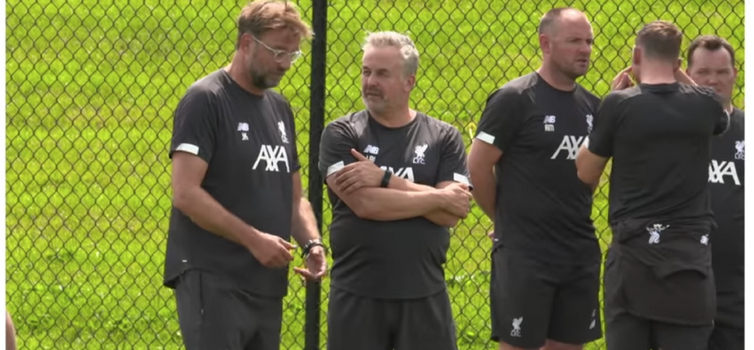Lee Richardson: The psychology of acceptance & control at Liverpool

Richardson (centre) has been with Liverpool since June 1st
Written by Simon Austin — May 10, 2020
LIVERPOOL performance psychologist Lee Richardson says “acceptance” has become the key word for the club during lockdown.
The 51-year-old former Chesterfield manager has worked with the Anfield outfit since June 1st, during which time they have won 27 of their 29 Premier League games.
However, his remit changed significantly in early March when the season was put on hold because of coronavirus - with the Reds within touching distance of their first title since 1990.
“When you can’t control events it’s better not to get too het up, to be as present-moment as possible,” Richardson told the Sunday Times. ”So the messages were around that: to enjoy time with their families, to treat this as a period of down time, to offer a few little strategies to help with this.
"And to them to expect to feel strange, to have fluctuations of mood and that I was around any time if they wanted a chat."
In consultation with manager Jürgen Klopp, Richardson sent the players a presentation about how to cope during the enforced break.
“Acceptance was the key word," he said. "It’s been tough for everyone at Liverpool given where we were [in the league] but going back to the values of the club - the manager set the tone on this - everyone realises there are more important things than football, that people are dying.
“So, yes, winning the title is important - and I’m confident it’s going to happen this year for Liverpool and there’ll be more to come - but we’ve just got to accept what’s happening. No one can control it. We are where we are. That was the message.
“As a football club, Liverpool knows better than any that football isn’t everything in life. The club is steeped in some tragic events that make you think a little more philosophically about things.”
The practitioner, who has also worked with West Ham and the England Under-19s, told Jonathan Northcroft about the “cycle of readiness” that has taken Klopp's team to the top.
“It’s, prepare, perform, reflect, refine," he said. "Prepare, perform, reflect, refine. And that matches up with efficacy. Momentum, in sport, is a psychological not physical state because winning builds self-efficacy, which is belief in yourself, and co-efficacy, which is belief in each other.
“Jürgen and his staff are fantastic at fostering and developing that — using not just personality but methodology.”
He also described a “mastery culture” at the club, leadings from Managing Owner Mike Gordon, Sporting Director Michael Edwards and Klopp all the way down to the staff and the players.
“It involves a constant striving for excellence, for being as good as you can be and there’s a multiplication factor - as well as Liverpool’s overall mastery culture, it is also the culture of individuals within the squad,” explained Richardson, who graduated with an Open University degree in psychology after the end of a playing career that took in spells at Blackburn Rovers, Aberdeen and Oldham.
He said “all the players have impressed me" but picked out "four who have really done so - the nucleus of senior, British lads at the heart of the group".
"Jordan Henderson, James Milner, Adam Lallana and Andy Robertson are very much a driving force. Their professionalism is a bit special. They have a real fire in their bellies.
“That culture to keep striving goes back to Liverpool’s past. The Sounesses, the Dalglishes - all those heroes of the 1970s and 1980s were relentless robots when it came to being the best.”
Richardson’s appointment was finalised last February after a lengthy process that began with meetings with Sporting Director Michael Edwards, then Liverpool’s medical rehabilitation and performance manager Phil Jacobsen, and finally Klopp and his assistant Pep Lijnders. He works at the club's Melwood training ground three times a week and is on call the rest of the time.
“Jürgen felt players could do with a resource they could tap into whenever they wanted, a confidant and the work I’ve done is mainly one-to-one with specific players, working in specific ways," he said.
“Jürgen was keen to – in his words – find the right person, not just any person. I feel comfortable in the game, and in the environment of elite sport. That feeling of belonging is something people in backroom staffs don’t always get, which means there’s a lot of striving to prove themselves and my potential strength is I don’t feel the need to try and impress anybody.”






-1.png)





